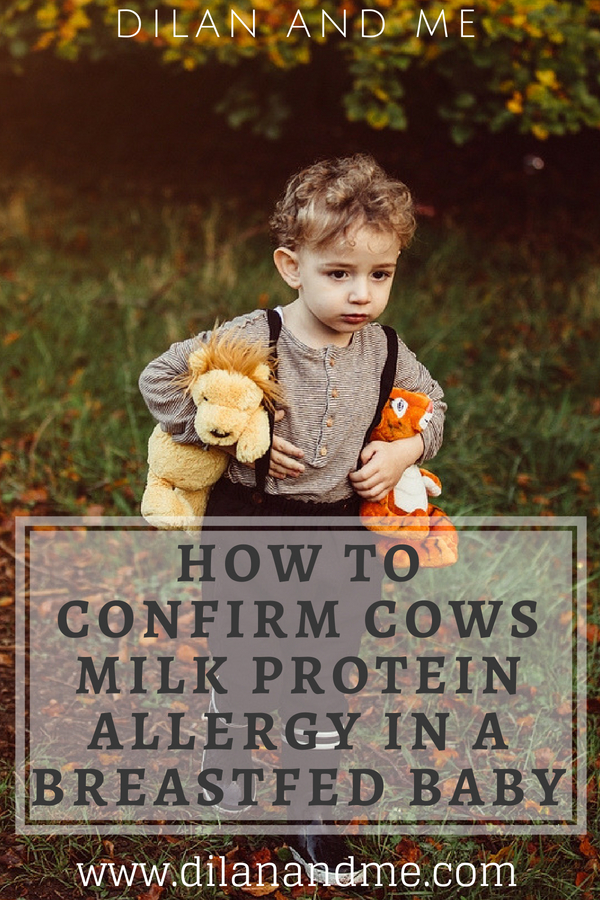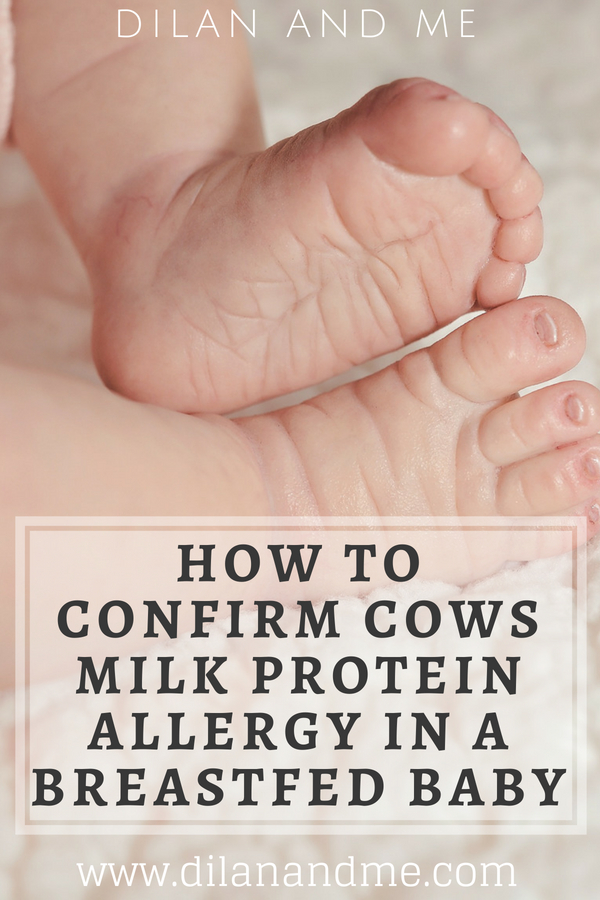One of the first questions parents ask once a CMPA diagnosis is mentioned is “How do we know for sure?” or “How can we confirm CMPA?”
I would love to be able to tell you that there is a very simple test to confirm the allergy but unfortunately it doesn’t work that way. In this post I will give a brief explanation of how you can confirm CMPA, specifically from a breastfeeding perspective. As usual please remember that the advice here should not be a replacement for consulting a trained health care professional, but it should help you to understand the process more clearly. For more information on CMPA check out our Breastfeeding with CMPA page and for a list of all my dairy free resources head over to the Breastfeeding With CMPA Directory.
How to Confirm CMPA
Symptoms
The first problem with being able to confirm CMPA easily is that the symptoms can vary so dramatically from child to child. Some children will suffer from rashes or eczema, some will have mucous filled nappies or excessive vomiting. Some of the most common CMPA symptoms are listed below, and your child may have one or several of these. This list is not exhaustive.
- Vomiting
- Reflux
- Diarrhoea, mucous/slime or green nappies
- Blood in poo
- Constipation
- Eczema
- Skin rashes, hives or swelling
- Poor weight gain
- Excessive crying or colic symptoms
- Congestion, mucous, continual coughs and colds
- Conjunctivitis
- Anaphylaxis
Allergy Testing
Unfortunately there is no magic test to confirm CMPA. The difficulty is that there are two different types of CMPA – an IgE mediated allergy (typically more immediate symptoms like hives), and a non-IgE mediated allergy (symptoms that are more delayed, for example gastro). The two tests currently available, skin prick tests (SPT) or blood tests, can only test for IgE allergies, meaning that if your little one has non-IgE CMPA the test would come back negative when in reality they could still have a serious allergy to cow’s milk. There are several other reasons why the tests are unreliable, especially in young babies, and could come back with either a false positive or a false negative. For this reason a dairy free trial and controlled reintroduction is the gold standard method to confirm CMPA.
Dairy Free Trial
Once you begin to suspect a dairy allergy you’ll need to confirm CMPA by starting a dairy free trial. For a formula fed baby your GP should prescribe a suitable dairy free formula, but if you’re breastfeeding this means you will need to completely cut out dairy from your diet. This sounds really overwhelming and it will be a learning curve for you, but it does get much easier. Plus continuing to give your baby breast milk means they will still be receiving all those wonderful gut healing benefits, which can be essential as they recover from exposure to the allergen.
The first thing you need to know is that dairy can hide any where, and the only way to successfully cut it out completely is to check the ingredients of every single thing you put in your mouth. Dairy has made its way into wine, ham, pickled onions and pineapple juice. Currently the law states that if an item contains milk it will be clearly stated in the ingredients in bold. For more help reading labels check out the CMPA FAQ page.
It can take up to three weeks for your system to be dairy free, and another three for your little one’s system to also be clear so you’ll need to trial a dairy free diet for at least six weeks in order to confirm CMPA. However often you should see an improvement much sooner. Keep an eye on your child’s symptoms and make a note if they subside, get worse or disappear completely.
The Yogurt Test
Hopefully once you have completely eliminated dairy you will see an improvement in your little one’s symptoms and you can be reasonably sure you’re on the right track to be able to confirm CMPA but you’ll need to reintroduce the allergen to make certain. This is often referred to as ‘the yogurt test’, but can also be done with anything high up the milk ladder such as a milkshake too. Eating one portion should be enough and you can expect to see a reaction within approximately 72 hours. Keep a note of when you eat the dairy and write down any symptoms if they occur. If you have any breast milk which you expressed before going dairy free this would be an ideal way to trial without contaminating your milk again.
If you haven’t seen a full improvement in symptoms after cutting out dairy you may need to consider cutting out further allergens before to test by reintroduction. The next allergen it would be advisable to cut out would be soya as there is a connection between CMPA and soya allergy as the proteins are very similar. Read more about this on the CMPA FAQ page.
Please note if your baby had very severe or immediate symptoms when reacting through your breast milk, such as breathing difficulties or hives, you will need to do this under the care of a dietitian or paediatrician. Your GP or health visitor can refer you.
CMPA Confirmation
If you find that symptoms return after the yogurt test this would confirm CMPA. You will need to remain on a completely dairy free diet, and once you start to wean onto solids your little one will need to also stay dairy free. Your health visitor or GP should refer you to a dietitian who will be able to help monitor your diet and ensure you are getting enough calcium, and they should also be able to help once you start to wean.
If symptoms don’t return then you should attempt a few more days of eating dairy, to rule out your little one reacting to a build up of milk proteins. No reaction means you can rule out CMPA.

Useful Links
Breastfeeding with CMPA Treat List – Chocolate and Cake!
Having a Child with CMPA – Our Story
The MAP Guidelines Interactive Algorithm for suspected CMPA in the first year of life
Cows Milk Protein Allergy Support webpage
Breastfeeding with CMPA and Other Food Allergies – UK Support Facebook page
Pin for later:


Hi I’m 4 weeks into a dairy free test. I went to my mother in laws for dinner a few days ago & have just found out that she confused “dairy free “ with “fat free”
So I need to start the whole trial again and go dairy deee for another 6 weeks? I asked my doctor but he said that he couldn’t advise because they don’t support the theory!
He did reacted after I unwittingly had the milk. He had terrible nappies for 2 days & I couldn’t figure out why, the doctor even diagnosed possible gastroenteritis. Then I found out about the fat free milk & it all made sense! Thanks for your nlog, it’s made a daunting task seem manageable
Author
Wow that is not good! Since you’ve seen a clear reaction to the dairy then you can use that as your confirmation of CMPA. Possibly ask for a new GP too! Let me know if you need any more help xx
I’m a Dad.
My Daughter was diagnosed via the NHS with a milk allergy when she was very very young. In fact the process began when we first attempted to ween her and so used baby rice which had milk protein in.
Thankfully our GP thought it was too severe to be colic or a cold etc and not a coincidence that she was just fed baby rice.. and so from that day she was back on the breast, and the following day had tests on the NHS, skin prick and food challenges. This gave the clear diagnosis.
She has the usual issues that accompany an allergy, asthma and eczema.
Many years on, and she is now 13, and is living a relatively normal life, breast fed until 3. She has been to the Allergy clinic for assessment and testing every year since she was 2, and we went last month for her most recent test and nothing has changed, still very highly allergic (Vapours in the air causes her problems too). The consultants and nurses are amazing, and always have been.
We are careful and have brought her up to be aware of foods and liquids around her, to understand that looking at ingredients is vital, and what the disclaimers on packaging means, the hazards of restaurants and other public spaces, and above all to understand she has to be partly responsible for her safety now that she is in her teens, which means not taking food from friends, being careful with what others may say, having friends who can spot the signs she may be beginning to have an attack, and to know how to help her.
Thankfully today she has only had one anaphylactic episode thanks to a restaurant not being honest about their ingredients – even though they were quizzed before ordering and told about my daughters allergies and I was given assurances. She was in hospital A&E/ER for two days in order to recover. There have been near misses, for example I remember having to tell her primary school that she needed to opt-out of the Warburtons Day at school, but some how she was made to stay in class while they all made dough and baked, then told to go for a walk on her own in the playground when she said she felt ill. I had an interesting chat with the school after that day.
She obviously carries her own Epi-Pens, anti-histamines and emergency Inhaler, and will do for the remainder of her life.
It is easy to see the world as a dangerous place for our allergic child, and an unfair one. I think of all the many parties I took my daughter to, through playgroup and primary school and the image of my daughter’s face looking at me feeling sad because the birthday cakes were amazing and that she couldn’t eat them, or that she couldn’t have the same things at her own parties, and she’d get upset as her friends wouldn’t want her cake – all this will forever stay with me.
It is important that our children realise the world has it’s dangers, but nothing should stop them living a good / happy life. The amount of ‘free-from’ products and alternatives are so extensive now, even just compared to a few years ago, vastly better than 10yrs ago! When people say it’s so unfair to me, I say it is what it is. My daughter knows no different. She is likely to be eating a far healthier diet then your average kid – she loves fish, meat, majority of veg , and fruit, never had a McDs, never had a ready-meal…
Most of the challenges for her now as she becomes a young-adult, will come down to a test of her own discipline, as her dad will no longer always be with her, to ensure she always carries her medication, to be careful about the choices and decisions she makes. I hope I will have done enough over the years as a single dad to have instilled some of this in her.
Finally, my Daughter was also diagnosed as highly allergic to Wheat, all Nuts, all forms of Diary, Egg white and Egg yolk, Spinach and many typical household pets, since the age of 2. The allergies have all been diagnosed at hospital allergy clinics in the NHS, which is the only safe way to be tested and to get a valid diagnosis in the UK. She faces high risk of Anaphylaxis across each of these food groups.
-Paul.